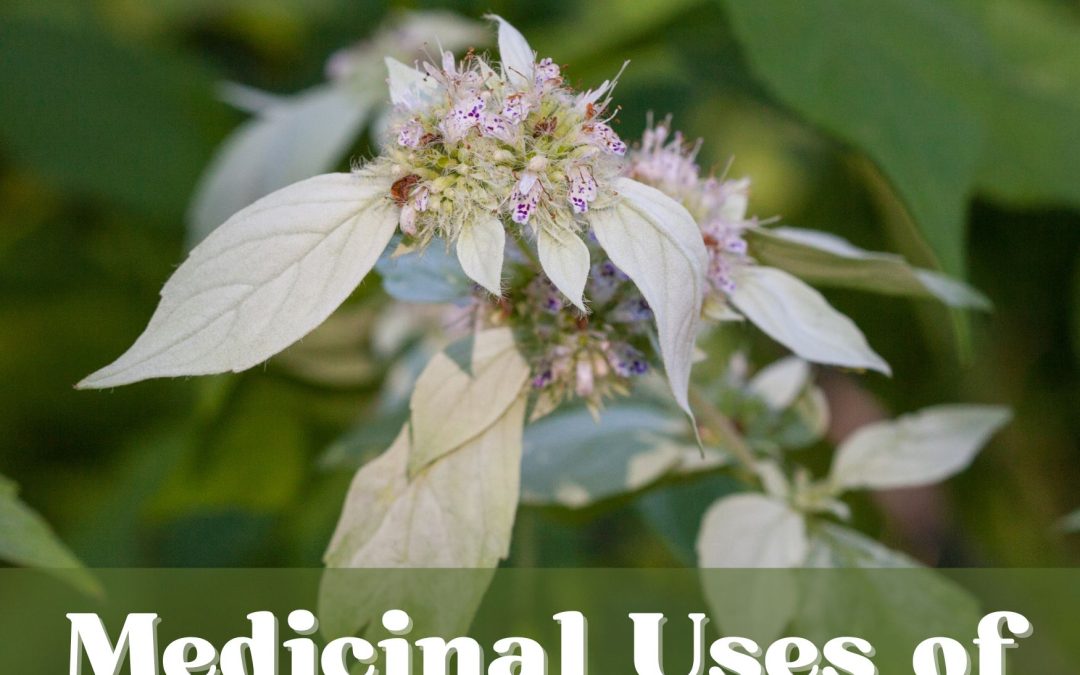This post may contain affiliate links, to learn more about them, check out our Disclosure.
Mountain mint (Pycnanthemum spp.) is a potent herb known for its aromatic properties and numerous medicinal benefits. Often found in North America, this perennial herb is not only a favorite among gardeners but also a valuable plant in traditional medicine. In this blog post, we’ll explore the medicinal uses of mountain mint, its benefits, common applications, and tips on how to use it effectively.
What is Mountain Mint?
Mountain mint belongs to the Pycnanthemum genus, which includes several species such as Pycnanthemum muticum (blunt mountain mint) and Pycnanthemum incanum (hoary mountain mint). Characterized by its square stems and dense clusters of tiny, fragrant flowers, mountain mint is a member of the Lamiaceae family, which also includes well-known herbs like peppermint, spearmint, and oregano.
Medicinal Benefits of Mountain Mint
Mountain mint has been used for centuries by Native Americans and herbalists for its wide range of medicinal properties. Here are some of the key health benefits associated with this herb:
- Antimicrobial Properties:
- Mountain mint contains essential oils rich in compounds like pulegone, menthone, and thymol, which have strong antimicrobial effects. These compounds help fight off bacteria, fungi, and viruses, making mountain mint an effective remedy for infections and wounds.
- Digestive Aid:
- Traditionally, mountain mint has been used to support digestive health. It can help relieve symptoms of indigestion, bloating, and gas. The herb’s carminative properties soothe the digestive tract, reducing discomfort and promoting healthy digestion.
- Respiratory Support:
- Mountain mint is a natural expectorant, meaning it helps clear mucus from the respiratory tract. This makes it beneficial for treating conditions like colds, coughs, and bronchitis. Inhaling the steam from mountain mint tea or using it in a vaporizer can provide relief from respiratory congestion.
- Anti-Inflammatory Effects:
- The anti-inflammatory properties of mountain mint can help reduce inflammation and pain in the body. It is often used to alleviate conditions such as arthritis, sore muscles, and other inflammatory ailments. Topical applications of mountain mint can soothe irritated skin and reduce swelling.
- Calming and Relaxing:
- Mountain mint has mild sedative properties that can help calm the nervous system. It is often used in herbal medicine to reduce anxiety, stress, and insomnia. Drinking mountain mint tea before bedtime can promote relaxation and improve sleep quality.
- Insect Repellent:
- Due to its strong aroma, mountain mint is an effective natural insect repellent. The essential oils in the plant help deter mosquitoes, ticks, and other pests. Rubbing fresh mountain mint leaves on the skin or using a mountain mint-infused oil can provide protection against insect bites.
Common Applications of Mountain Mint
Mountain mint can be used in various forms, depending on the intended medicinal use:
- Herbal Tea: Dried mountain mint leaves can be brewed into a tea to aid digestion, relieve respiratory issues, and calm the nerves.
- Essential Oil: Mountain mint essential oil can be diluted and applied topically for its antimicrobial, anti-inflammatory, and insect-repellent properties.
- Poultice: Crushed fresh mountain mint leaves can be applied as a poultice to soothe insect bites, reduce swelling, and treat minor wounds.
- Steam Inhalation: Adding mountain mint leaves to boiling water and inhaling the steam can help clear respiratory congestion and provide relief from colds and coughs.
- Salve: Infusing mountain mint in oil and mixing it with beeswax can create a soothing salve for sore muscles, joint pain, and skin irritations.
How to Use Mountain Mint Safely
While mountain mint offers many health benefits, it’s important to use it with care. Here are some safety tips to consider:
- Pregnancy and Breastfeeding:
- Pregnant or breastfeeding women should consult a healthcare provider before using mountain mint, especially in large quantities, as some species contain compounds that may not be safe during pregnancy.
- Essential Oil Use:
- Mountain mint essential oil should always be diluted before applying to the skin, as it can be irritating in its concentrated form. Perform a patch test to ensure you do not have an allergic reaction.
- Internal Use:
- While mountain mint tea is generally safe for most people, consuming large amounts of the herb can lead to digestive discomfort. Start with a small amount and monitor your body’s response.
- Interactions with Medications:
- If you are taking any medications, especially for digestive or respiratory conditions, consult with a healthcare provider before using mountain mint, as it may interact with certain drugs.
Mountain mint is a versatile and powerful herb with a wide range of medicinal uses, from supporting respiratory and digestive health to providing natural relief from anxiety and inflammation. Whether you’re brewing a soothing tea, creating a healing salve, or using it as an insect repellent, mountain mint is a valuable addition to any herbal medicine cabinet. However, as with any herbal remedy, it’s important to use mountain mint with care and consult a healthcare provider if you have any concerns. By understanding its benefits and applications, you can harness the healing power of mountain mint safely and effectively.

